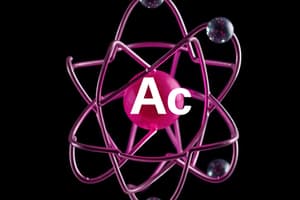Podcast
Questions and Answers
What determines an atom's chemical identity?
What determines an atom's chemical identity?
- The number of neutrons in the nucleus
- The sum of protons in the nucleus (correct)
- The number of electrons orbiting the nucleus
- The mass number of the atom
Which of the following particles has a positive charge?
Which of the following particles has a positive charge?
- Electrons
- Protons (correct)
- Neutrons
- Isotopes
What is the process called when an atom becomes charged due to a loss or gain of electrons?
What is the process called when an atom becomes charged due to a loss or gain of electrons?
- Excitation
- Ionization (correct)
- Relaxation
- Radiation
Which statement is true about isotopes?
Which statement is true about isotopes?
What type of motion does the nucleus of an atom exhibit?
What type of motion does the nucleus of an atom exhibit?
Flashcards
Atom
Atom
The smallest unit of an element that retains the chemical properties of that element.
Nucleus
Nucleus
The central region of an atom, containing protons and neutrons.
Protons
Protons
Particles found in the nucleus of an atom, carrying a positive charge.
Neutrons
Neutrons
Signup and view all the flashcards
Isotopes
Isotopes
Signup and view all the flashcards




